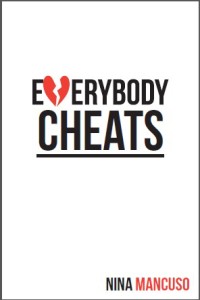From “Othello” to Jackie Collins literature both great and not-so-great has always offered insights into the ups and downs and ins and outs of romantic relationships. This is not exactly a new fascination. But in the wake of the Ashley Madison hack, the popular conversation has turned to the subject in a more prosaic way, focusing as much on why we do what we do when relationships don’t suit our needs as how to find the perfect relationship — presumably the one that will keep us at home and in love rather than off giving personal data to dodgy web sites in pursuit of, if not something better, at least something distracting.
This edgy but oddly sensible little book takes on the subject in a surprisingly fresh and personal way. Mancuso opens with a rather detailed list of her own relationships and what did and did not work about them, then makes the core argument of the book.
She argues, wisely, I think, that in order to form a successful, long-term relationship with someone else, to find our “other half” or “soulmate,” we must first find ourselves. Too often we make commitments because we are unwilling to be alone for those crucial years in which we are developing the maturity to know who we are and not only what we need, but what we are able to give. Mancuso boils it down to this: We are unhappy in relationships because we settle for less than the perfect partner rather than waiting—and growing—until we find our “soulmate.”
Yes, this is an irredeemably romantic argument, yet this book itself is refreshingly down-to-earth, demonstrating that the idea of a soulmate, of a perfect other who is not quite as other as other others, is not as woo-woo and far-fetched as one might suppose. Everybody Cheats has a young, hip vibe, drawing support from pop culture (“South Park” and YouTube comedians make frequent appearances) and Mancuso’s own experience rather than from academic research. She doesn’t even try that common modern approach of making her claim then casting around for some expert or study to cite to back it up. She just tells like she sees it.
Mancuso analyzes and demolishes (often with an undisguised glee) a few common arguments for why cheating might be a good idea, distills the arguments to their basics, and dispatches them with the same acerbic wit that she uses throughout the book. She also discusses the effects cheating has on people outside the intimate relationship itself, children and society at large.
You are not in the hands here of a stuffy sociology professor nor of a finger-wagging moralist. The tone is witty and conversational – a conversation littered with words like “dickhead, fucktard, and dipshit,” though the tone is actually and for the most part less aggressive and juvenile than that list might suggest.
This book is well written, friendly, and I expect its basic advice — enjoy your youth, live your life, and leave your options open so that when you do meet that perfect partner you’ll be ready — will be welcomed by a generation with more options than they know how to deal with and perhaps fewer than they had hoped.
Links
NinaMancuso.com
Twitter
Amazon
Goodreads
Review Overview
Design
Content
Editing
Get an Editorial Review | Get Amazon Sales & Reviews | Get Edited | Get Beta Readers | Enter the SPR Book Awards | Other Marketing Services
























Leave A Comment